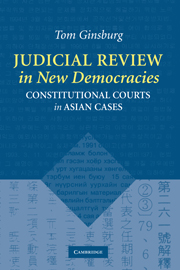Book contents
- Frontmatter
- Contents
- Acknowledgments
- Notes on Usage
- Judicial Review in New Democracies
- Introduction: The Decline and Fall of Parliamentary Sovereignty
- 1 Why Judicial Review?
- 2 Constituting Judicial Power
- 3 Building Judicial Power
- 4 Courts in New Democracies
- 5 Confucian Constitutionalism? The Grand Justices of the Republic of China
- 6 Distorting Democracy? The Constitutional Court of Mongolia
- 7 Rule by Law or Rule of Law? The Constitutional Court of Korea
- 8 Conclusion: Comparing Constitutional Courts
- Bibliography
- Index
7 - Rule by Law or Rule of Law? The Constitutional Court of Korea
Published online by Cambridge University Press: 21 July 2009
- Frontmatter
- Contents
- Acknowledgments
- Notes on Usage
- Judicial Review in New Democracies
- Introduction: The Decline and Fall of Parliamentary Sovereignty
- 1 Why Judicial Review?
- 2 Constituting Judicial Power
- 3 Building Judicial Power
- 4 Courts in New Democracies
- 5 Confucian Constitutionalism? The Grand Justices of the Republic of China
- 6 Distorting Democracy? The Constitutional Court of Mongolia
- 7 Rule by Law or Rule of Law? The Constitutional Court of Korea
- 8 Conclusion: Comparing Constitutional Courts
- Bibliography
- Index
Summary
INTRODUCTION
The two previous case studies of Taiwan and Mongolia traced the growth of judicial power in the shadow of dominant Leninist parties. In both cases, the dominant party was able to maintain substantial influence on the constitutional court in a democratic era, even as the preferences of the party evolved to reflect the changing rules of the political game. Korea presents a very different context for democratization because the prior regime was a military dictatorship. This type of regime has a different capacity for influencing a court under conditions of democratization, as argued in Chapter 3. Unlike dominant parties, military authoritarians have difficulty translating their power into democratic constitutional schemes. Their only threat is to exit the constitutional order completely. The Korean case therefore illustrates the difference between political party and military regimes in setting the stage for judicial review.
Unlike Taiwan and Mongolia, Korea's democratization process is sometimes characterized as incomplete. Whereas local scholars and politicians in the former two countries celebrate the successful transformation to democracy, scholars of Korean politics focus on the imperfections of its democracy, using such terms as procedural democracy, partial democracy, and electoral democracy to reflect their ambiguity. By any objective measure, however, Korea has made great strides since 1988 in reestablishing representative institutions, expanding protection of civil rights and political liberties, and transferring effective power from the military to civilians. The 1998 presidential inauguration of long-time dissident Kim Dae-jung marked a significant milestone in this regard.
- Type
- Chapter
- Information
- Judicial Review in New DemocraciesConstitutional Courts in Asian Cases, pp. 206 - 246Publisher: Cambridge University PressPrint publication year: 2003
- 1
- Cited by



